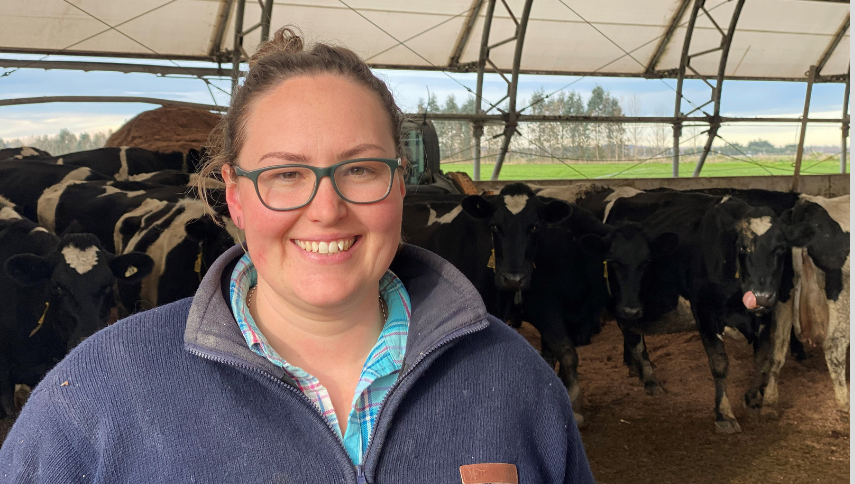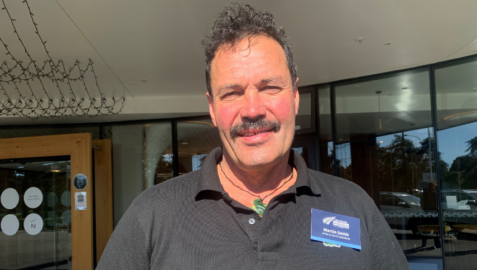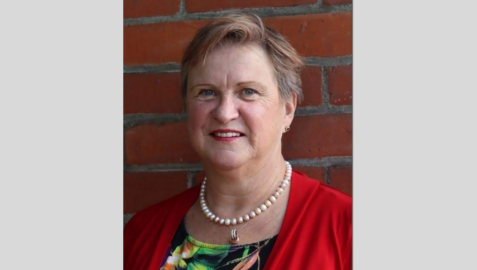
Making Farming Easier
Module Overview
Southland dairy farmer Brooke Flett shares how a new programme designed to boost the resilience of rural communities helps her navigate the challenges of farming.
Whereabouts are you farming?
I work on our family dairy farm in Southland. I’m the fourth generation to farm here and I’ve been back on farm for seven years. We’re winter milking 680 cows with the help of five staff, including myself.
What do you enjoy about farming?
I’m very fortunate I’m farming with family. My parents are still involved and I’m farming alongside my brother. I really enjoy being able to work with them and carry on my parents’ farming business.
I also like the freedom and flexibility – some days you’re doing an afternoon of admin, other days you’re outside working in the sunshine. You’re your own boss. I like the way farming works too – you get out what you put in – and can see the benefits of your hard work.
Farming brings it fair share of pressure too. Tell us about that.
Yes, Dad and I were just chatting yesterday about that, because we have all been working some long days and it feels never ending. We were trying to work out what changes we can make and being quite honest with ourselves that as much as we need time off to refresh, that’s not always going to be possible unless we make changes with things we can control.
There’s always a long to-do list on farm. Getting breaks can be hard, can’t it?
Yes, but I think we’re often our own worst enemies because we love the work. But the reality is you’ve got to take some time every now and then to have a break. As I told Dad, it’s about being in a position to decide for yourself when you need a sleep in, even if you decide not to do it. I don’t mind doing the hours, but if the option’s not there, and you’re completely head down, bum up all the time without a break, that’s when farming gets hard.
Busy as you are, you enrolled in the Know Your Mindset course on managing pressure and change. What made you sign up?
I’d done other AgriWomens’ courses and liked them. A course that was going to stop me feeling too stressed or overwhelmed sounded a great idea. There’s lot of content out there about this, but this course had a proper rural lens to it. It’s easy to just say ‘do this and remove stress from your life’ but it’s hard to make it work in a farming context because there’s so much about farming you can’t control, like the weather. It can feel impossible at times.
So, what did you learn?
I learnt to recognise the early signs of stress, what my particular triggers were and the main challenges to my wellbeing on farm. Once you can name these things you can start to navigate through them, rather than waiting til you’re so stressed out you can’t think.
How do you navigate them?
It’s about prioritising what needs to happen next to reduce your stress. Those priorities are based on your own values – why you’re farming and what you’re looking to get out of it.
How have you applied this back on farm?
These days I’m much more aware of what I add to my to-do list and say ‘yes’ to. For example, I love being part of our wider community, but I can’t say yes to everything because that just adds pressure. So now I choose things that align best with my values. That determines where I’ll put time and energy.
What about time off?
Yes, that’s been a good outcome. I now consciously schedule time to get off farm to do things that connect with my values, whether it’s doing things with friends off farm or taking trips away to a farming conference. I’ve allowed those things to be a priority because I realise they’re important to me and my wellbeing.
What was the biggest change in your mindset? Give me an example.
It’s funny, I’d always heard messages about the importance of keeping active for your mental health, but I thought, the last thing I need to do is play sport after a day’s farming! But this year, I changed my mind and joined a netball team and I’m really enjoying being part of it. Sometimes I don’t have a lot of energy when I arrive, but once I’m there I love it, and when I leave, I feel like I’ve gained a lot more energy. The impact it has is amazing.
How does this benefit the farm?
When you’re in the right headspace, you make better decisions on farm. You also have the energy to keep going despite day-to-day challenges like the weather or staff issues. It makes farming easier.
This all sounds obvious, but many farmers don’t do it, do they?
You can become isolated in farming. One of the benefits to signing up for the course is that it instantly connects you to a network of other people and to all these resources that can help you. There’s no point waiting for that help when you’re already at a low point.
These are exceptional times with lots of issues to grapple with in farming – Covid-related labour shortages, weather events, changes in the economy. How has the course helped you handle those?
There’s a lot going on out there all right. It’s easy to just shut down at the thought of change. But if you feel more in control mentally and have a positive mindset, you start thinking, ‘Yeah, I could make that work. Maybe we should look at it.’
Managing change is about prioritising what needs your most urgent attention and problem solving that. It’s also about your mindset. There are always going to be challenges and change in farming, but you still have a choice about how you’re going react to them. That’s why this programme is so helpful. It gives you the energy and thinking capacity to move forward.
Have people at work noticed any difference in you?
I think people have noticed I’m in a different headspace when challenges happen on farm. I take a pause and give myself time to think rather than just react to a situation, whether it’s weather or staff.
I think I’m more open to feedback too. That’s probably been a big one for me. I process what people are saying in a more positive way, instead of being defensive. You need to be in the right frame of mind to be open to other people’s ideas.
What’s your message to someone on farm reading this? Why should they enrol in the course?
As a farmer, you take time to talk to fertilizer reps to learn about options for growing your grass. This course is the same thing. You’ve got to take time to look after yourself and to grow your own skills. That way, you’ll have the mindset required to make better decisions in your business and make more time for the things that are important to you. It’s an investment in you.
‘Know Your Mindset. Do what Matters’ has been developed by the Agri-Women’s Development Trust (AWDT) with the support of MPI, Farmstrong and Beef + Lamb New Zealand. It teaches a range of techniques to help people manage pressure and change.
Registrations for Know your Mindset. Do what Matters 2022 are now open via www.awdt.org.nz. Programmes start on Tuesday June 7 and Thursday June 9.


